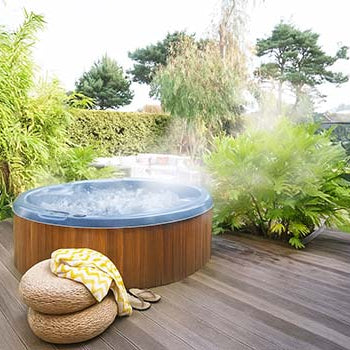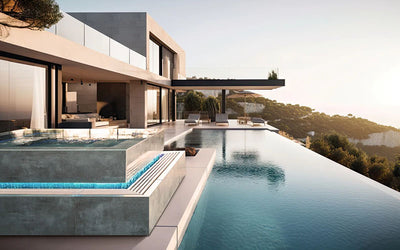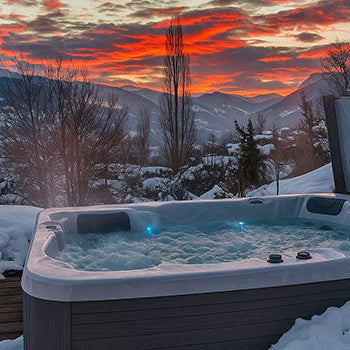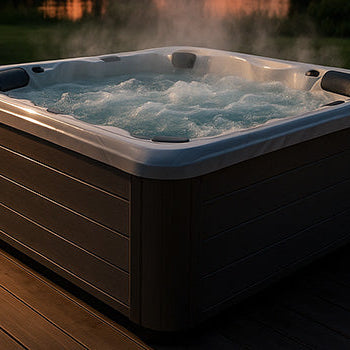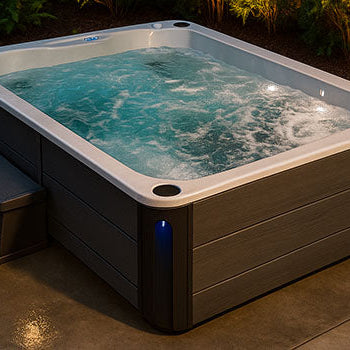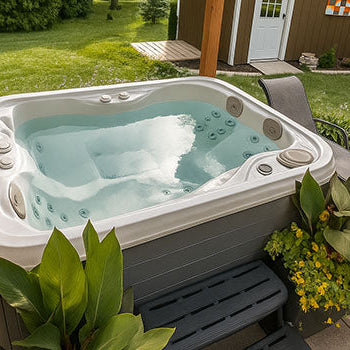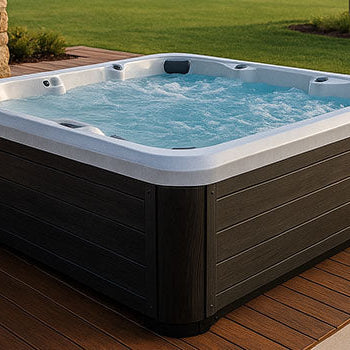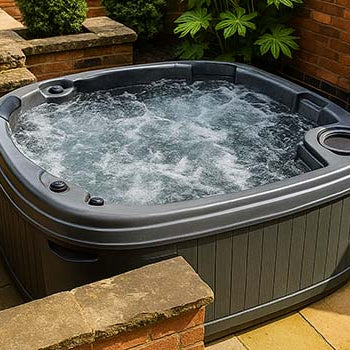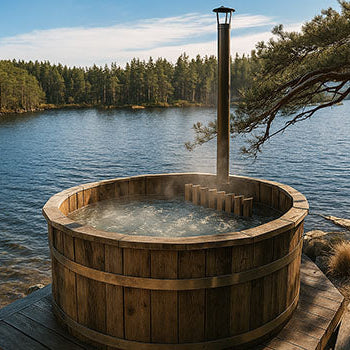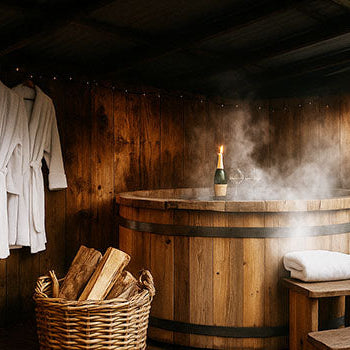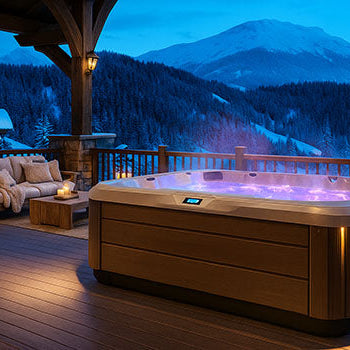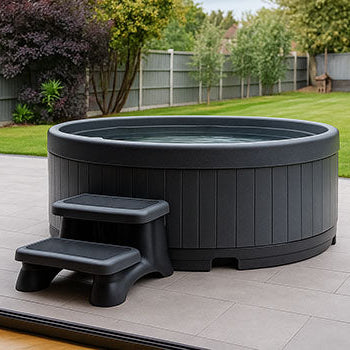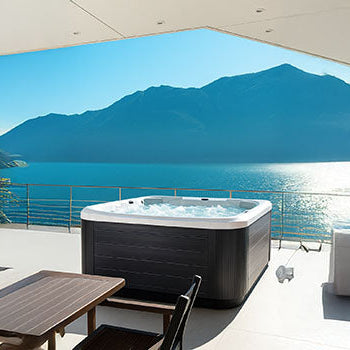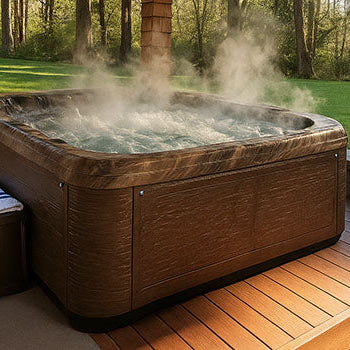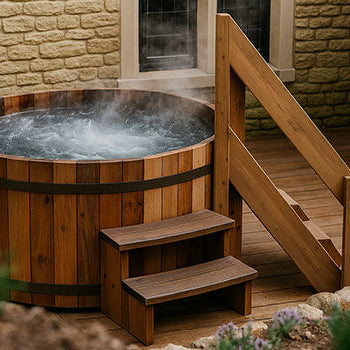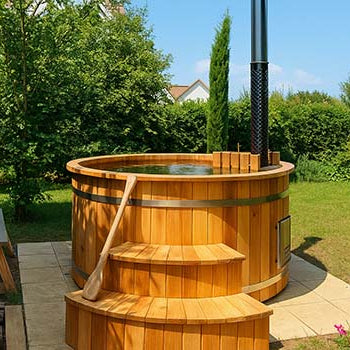Worried your hot tub might be louder than your neighbour’s lawnmower?
Here’s the reality: modern hot tubs are designed to run quietly, especially when installed correctly and maintained well. From sleek acrylic spas to rustic wooden tubs and rotomoulded tanks, most are built for peace, not noise.
But if you're concerned about loud jets or grumpy neighbours, you need to know what causes the noise, and how to control it. Let’s break it down.

What Makes Noise in a Hot Tub?
Hot tubs aren’t silent, but they’re not supposed to sound like jet engines either. Here's what causes the most ruckus:
The Main Culprit: Pumps (Circulation and Jet Pumps)
Circulation pumps are quiet workhorses. They move water slowly to keep it clean, barely a hum.
Jet pumps, on the other hand, bring the power. When you turn on the massage feature, that loud whir is the jet pump kicking in. Newer models switch between quiet filtration mode and full massage mode to keep noise under control when jets aren’t in use.
The Sound of Bubbles and Jets
Bubbles sound fun, until it’s midnight and your garden sounds like a soda factory.
Air jets produce a distinct hissing or gurgling, depending on pressure settings. It’s not just water moving, it’s air mixing at high velocity. The louder the jet setting, the more noticeable the sound.
Heater Operation Noise
Heaters are nearly silent. You might hear a faint click or hum when they kick in, but unless you're standing nearby, you won’t notice.
User Noise: Splashing and Talking
Here’s the truth: most noise comes from people, not the tub.
Laughing, shouting, splashing, add a Bluetooth speaker and it’s a garden rave. This is especially important if you're close to neighbours or have thin garden walls.
How Loud Are Hot Tubs Typically? (Decibel Levels Explained)
So how noisy is a hot tub, really? Most fall between 40 and 70 decibels, depending on what it’s doing.
Comparing Noise Levels: Different Modes (Heating, Filtering, Jets On)
Here’s a quick comparison:
In quiet mode, your tub hums along at low levels. Jets on high? That’s when the noise kicks up.
Factors Influencing Hot Tub Noise Output
Several factors control how loud your hot tub gets. Know these, and you’ll know how to fix the problem.
Jet Speed, Water Pressure, Pump Quality, and Number of Users
More speed = more sound.
High-speed jets and strong pumps create more water turbulence, especially if multiple users hit all the buttons at once
A quiet soak turns loud fast when five kids jump in and hit every button.
Quality of Components and Insulation
Better parts make for quieter spas. High-end tubs use insulated cabinets, efficient pumps, and vibration-dampening tech.
Cheap tubs? You’ll hear them across the fence. The noise is often from weak insulation and budget pumps.
Age and Condition of the Hot Tub
Old tubs get loud. Loose screws, worn bearings, or a struggling pump can create rattling, groaning, or grinding.
If your tub sounds off, it likely needs servicing.
Installation Surface and Location
Your base matters. Concrete absorbs vibration. Hollow decks amplify it.
Open spaces echo sound; enclosed corners contain it.
Use nearby fences, shrubs, or walls to act as natural sound barriers.

Quiet Hot Tubs: Are Some Models Quieter Than Others?
Yes. And it’s not random, it’s in the design.
Features of Quieter Hot Tubs (Variable Speed Pumps, Better Insulation)
Look for:
-
Variable-speed pumps that adjust automatically
-
Full-foam insulation that traps both heat and sound
-
Quiet circulation systems designed for low-noise operation
-
Soft-close lids to avoid banging and reduce heat loss
Brands Known for Quieter Operation
Some brands focus on silent operation by:
-
Using smart water flow designs
-
Building noise-absorbing insulation into the frame
-
Choosing energy-efficient, low-decibel pumps
If quiet matters to you, ask for decibel ratings before buying.
Hot Tub Noise and Neighbours: Avoiding Complaints
Hot tubs should relax you, not trigger next-door disputes.
Understanding Potential Nuisance Noise (UK Context)
In the UK, loud hot tubs can count as statutory nuisances.
If your spa disturbs the peace, especially at night, your local council can intervene.
Placement Strategies to Minimise Disturbance
Strategic placement reduces noise complaints:
-
Avoid putting your tub near your neighbour’s windows
-
Use fences, hedges, or pergolas to block and absorb sound
-
Point jets and speakers away from property lines
A little planning prevents a lot of issues.
Agreeing on Usage Times
If you're friendly with your neighbours, talk it out:
-
No jets after 10 PM?
-
No speakers after 9?
Setting expectations early avoids arguments later.
Practical Tips for Hot Tub Noise Reduction
You don’t need to redesign your garden, just get a little clever.
Proper Installation on a Solid, Level Base
Avoid hollow or uneven surfaces.
Install on solid concrete or stone to reduce vibrations and movement.
Using Anti-Vibration Pads
Simple rubber mats or pads placed under your spa can dramatically reduce mechanical hum.
Especially helpful on decks or raised platforms.
Building an Enclosure or Using Screening
Screens, fences, and landscaping buffer noise naturally.
Bonus: they improve privacy and aesthetic appeal.
Acoustic Insulation Options
Go further with:
DIY upgrades like this can cut operating noise by 10–20 decibels.
Regular Maintenance to Prevent Increased Noise
Noise = neglect.
Check your hot tub regularly:
-
Tighten loose screws
-
Clean filters
-
Lubricate pumps
A well-maintained tub is a quiet tub.

Conclusion: Managing Hot Tub Noise for Peaceful Soaking
So, are hot tubs noisy?
They don’t have to be.
With smart setup, good maintenance, and the right components, your spa can stay quiet, calm, and neighbour-approved.
Whether it’s an acrylic luxury spa, a wooden hot tub, or a rugged rotomoulded model, the right choices make all the difference.
Want that perfect soak without the soundtrack? Make noise control part of your spa plan.
